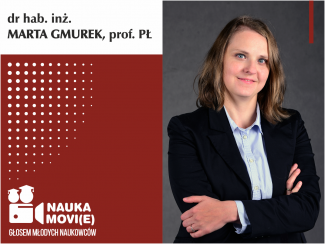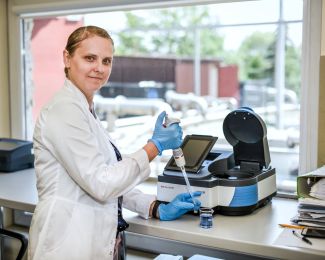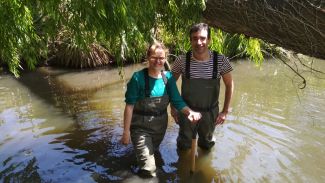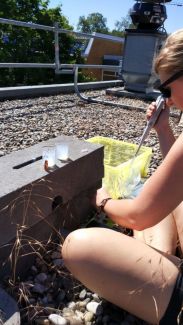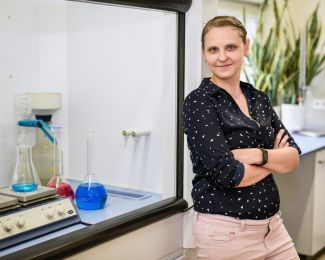The work of scientists is exciting, and its results in the form of research improving the quality of life inspire students who decide to pursue a scientific career. The participants of the "Science Talk(ie)s" series will present their research carried out at Lodz University of Technology with the voice of young scientists. The first researcher is Assoc. Prof. Eng. Marta Gmurek, Professor of TUL from the Faculty of Process and Environmental Engineering.
For the researcher, the icon of a female scientist remains Maria Skłodowska-Curie. Marta Gmurek, PhD, knew already in high school that she wanted to have an impact on the environment by working in the laboratory on water purification. She graduated from Environmental Engineering, and later she was awarded her PhD at Lodz University of Technology. Only 4 years after her doctorate she received habilitation in Environmental Engineering.
Less consumerism, less plastic, less chemistry – this is your appeal. What are the biggest challenges related to environmental protection on a global scale?
There are many problems of this nature, however, taking into account my scientific interests, I believe that topics related to water pollution as a result of xenobiotics and microplastics or the occurrence of antibiotics, antibiotic-resistant bacteria and antibiotic resistance genes should be a priority.
What is the purpose of your research?
My research focuses on processes that will provide a lot of important information on the mechanisms of water self-purification in photochemical processes involving visible radiation. I deal with a wide analysis of the impact of various physical and chemical factors on the course of the photodegradation process of xenobiotics (pharmaceuticals, pesticides, or preservatives used in cosmetics, food, etc. - parabens). I conducted research in both model and real systems. This allows to compare the course of the reaction in laboratory conditions with processes taking place in natural conditions, in the presence of substances that may interfere with the photodegradation of substrates by competing for access to light, or accelerate it as a result of the synergistic action of several photoprocesses.
Why is it so important to develop an effective method of removing all harmful substances from wastewater?
Unfortunately, compounds which belong to a wide group of xenobiotics are used in significant quantities in various industries, such as: agriculture, petrochemical, pharmaceutical, cosmetic or animal breeding. Taking into account the product cycle, very often these compounds, in an un-metabolized form, are transferred to the sewage, from where they mainly enter water reservoirs, e.g. applied pesticides as a result of run-off from agricultural areas penetrate into surface waters. From there they are transferred to water treatment plants, which, are not effective in disposing of these compounds.
What are the effects of this?
As a result, environmentally hazardous substances are detectable in drinking water, from which they can be absorbed into the body. Due to the characteristics of xenobiotics, which negatively affect human and animal populations, a method of their degradation is being sought, as nature also cannot handle biological neutralization of toxins on its own. Advanced oxidation processes have been used for many years in water treatment plants (based on UV) or during ozonization of e.g. swimming pool water. Nevertheless, in view of the huge amounts of xenobiotics consumed and emitted to the environment every year and due to the proven harmful environmental and health effects of the substances I am interested in, knowing the possible ways of their phototransformation/transformation in water bodies is of great importance for health protection.
This research is interdisciplinary in nature.
In connection with the established cooperation with the textile industry and thanks to the initiatives undertaken with dr Lucyna Bilińska, it has also been possible to conduct in-depth research on the application of processes based on the hybrid action of ozone with catalytic and electrochemical processes. Recently, I have also devoted a lot of attention to research on the use of reactive oxygen species to inactivate bacteria and viruses and antibiotic-resistant genes.
Can wastewater analysis say something about society?
Definitely yes. There are research teams focusing on the analysis of e.g. consumption of antidepressants or narcotics in a given area. From the analysis you can immediately find out the seasonality of their use. Recently, environmental monitoring has been used in Sweden to analyse the occurrence of Covid-19 virus in municipal wastewater, thus detecting epidemic outbreaks. Therefore, qualitative and quantitative analysis of wastewater can be very interesting. Studies show that the amount of pharmaceuticals in the wastewater is alarming. Unfortunately, due to the lack of systemic solutions, it is not necessary to determine or even test the concentrations of certain substances after wastewater treatment processes. Thus, substances harmful to the environment, which are not analysed quantitatively or even qualitatively, are released from the wastewater treatment plant together with the "treated sewage".
You have extensive experience in international cooperation and you are about to start another foreign internship. What will you be working on?
Over the last few years, I have completed many internships abroad. but I must admit that the one I am about to start at the beginning of next year is my greatest success. This is a very prestigious international Humboldt Research Fellowship for Postdoctoral Researchers funded by the Alexander von Humboldt Foundation. For a year at the Karlsruhe Institute of Technology, I will be able to carry out a project focusing on the use of solar radiation in photocatalytic processes for the degradation of antibiotics and inactivation of antibiotic-resistant bacteria and antibiotic-resistance genes. This is a continuation of my previous research.
Why is it worth being a scientist?
First of all, because it is a very interesting work which motivates towards continuous development, gaining knowledge, broadening horizons. But you also meet amazing people from all over the world.
Marta Gmurek, PhD, Professor of Lodz University of Technology also writes about the consequences of environmental pollution for the society on the blog of TUL scientists.

